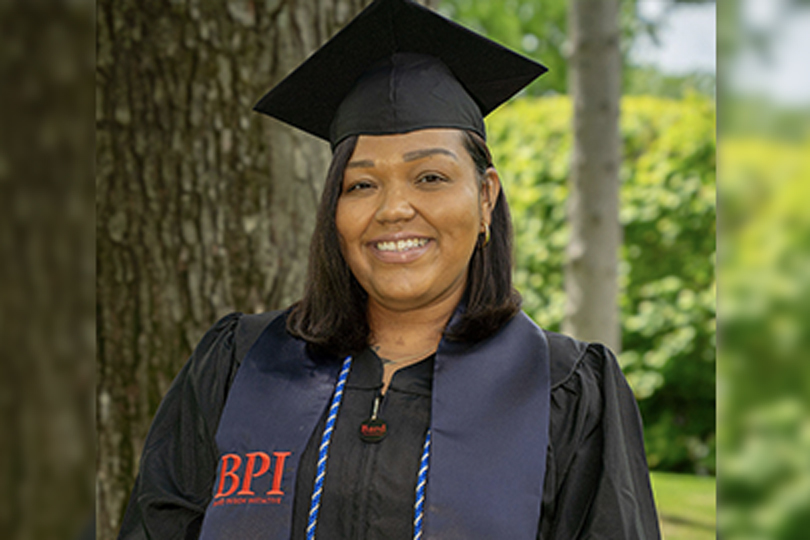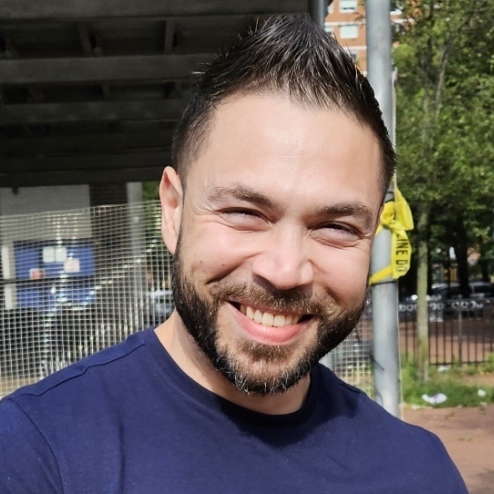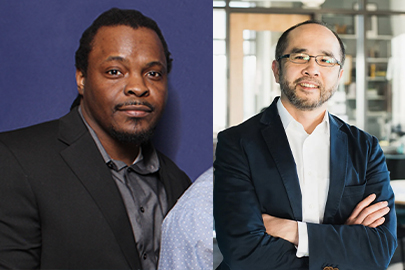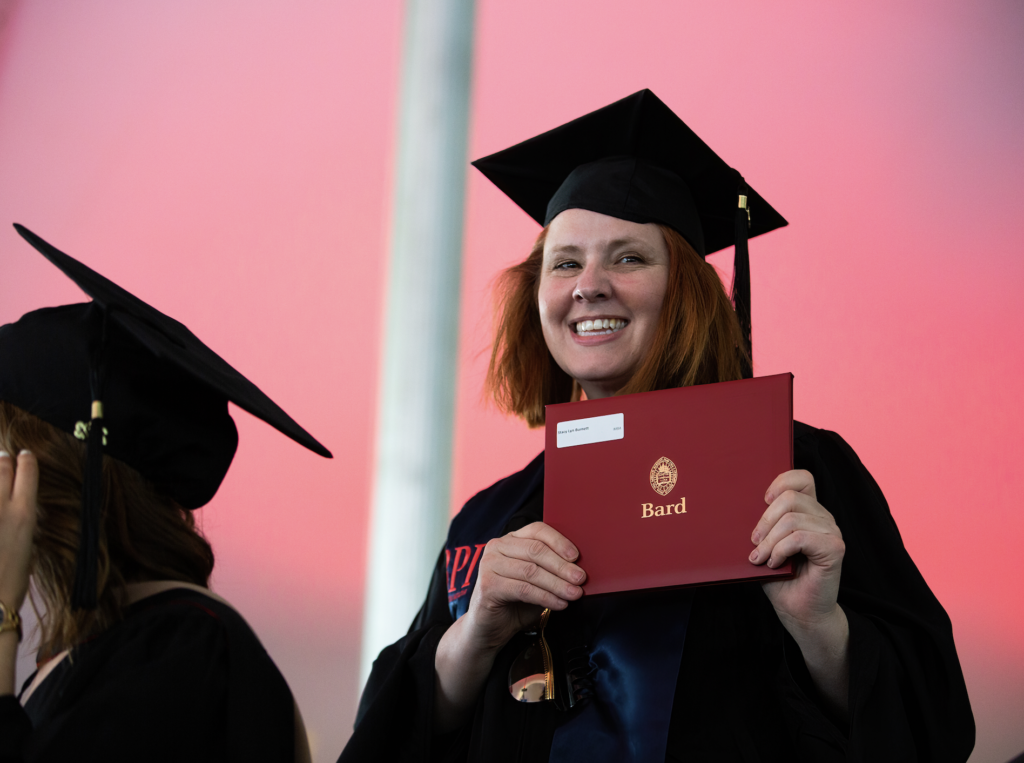In 2015 the story of the Bard Prison Initiative Debate Union’s win over Harvard became a global news story. Leslie Brody of the Wall Street Journal, who was there for the debate, first broke the story. Now, four years later, Brody reunited with the BPI alumni who were on the debate stage that evening to find out what has happened to each of them since. The debate was also captured by camera crews filming for the upcoming documentary series College Behind Bars, which is coming out on PBS in November. This article, reproduced in part below, first appeared in the Wall Street Journal.
Three Prison Inmates Beat Harvard in a Debate. Here’s What Happened Next.
After earning diplomas from the Bard College initiative, they are using their skills to forge new paths
By Leslie Brody, Wall Street Journal
Oct. 19, 2019

Dyjuan Tatro speaks with audience members after the screening of ‘College Behind Bars’ at the New York Film Festival this month. JAMES SPRANKLE FOR THE WALL STREET JOURNAL
When inmates in a New York maximum-security prison beat Harvard in a debate four years ago, their victory made international headlines and highlighted the intellectual talent behind bars.
Now, the three debaters who outsmarted the Ivy Leaguers have a new round of accomplishments. Two have found professional footing after release. The third, still in prison, has earned a master’s degree and wants to work in public health someday.
They say they always will feel bonded to their debate team at the Bard Prison Initiative, which offers free college to incarcerated men and women. They aim to prove the power of a rigorous education to turn lives around.
“We hope we can tell a story that changes the narrative of who people in prison are,” said Dyjuan Tatro, who took the debate stage that high-pressure afternoon inside Eastern New York Correctional Facility in the Catskills. He calls his team’s triumph “a story about hard work, redemption and hope.”
The debate team at the Bard Prison Initiative, which offers free college in New York prisons, made international news when it beat Harvard four years ago. Here is a first glimpse of the competition, from a new PBS documentary, “College Behind Bars.” Photo: PBS
The Bard Prison Initiative, part of Bard College in Annandale-on-Hudson, enrolls more than 300 students inside six New York prisons. About 20 men at a time earn coveted spots on the debate team at Eastern, which has lost only two of its 11 matches in six years. This past spring, it beat challengers from the University of Cambridge in the United Kingdom.
The win over Harvard provides one of the emotional peaks in a new four-hour documentary, “College Behind Bars,” which explores the lives of people serving time for serious offenses and struggling to become productive citizens.
Directed by Lynn Novick and executive produced by Ken Burns, the series will air Nov. 25 and 26 on PBS.
‘Defying Expectations of Who College Is For’
With a broad smile and close-cropped beard, Mr. Tatro cuts an elegant figure as he juggles meetings and calls at work. Thirty-three years old, he was released from prison two years ago, after 12 years of incarceration for assault, and now has a bachelor’s degree from Bard College as a math major.
He worked for U.S. Rep. Sean Patrick Maloney during his unsuccessful bid for New York attorney general, advising the Democrat on criminal-justice issues. They met when the congressman took an interest in Bard’s model for college in prison, which has been replicated nationwide.

Dyjuan Tatro was a member of the Bard Prison Initiative debate team at Eastern New York Correctional Facility that beat Harvard University in 2015. PHOTO: JAMES SPRANKLE FOR THE WALL STREET JOURNAL
Now Mr. Tatro, who lives in Manhattan, is a government-affairs and advancement officer for the Bard Prison Initiative, trying to help lawmakers understand its goals and fund its expansion.
“We’re in the business of defying expectations of who college is for and where it might lead,” he said.
The prison initiative depends mostly on private donors. Its leaders are pushing for the broad restoration of federal Pell grants for tuition for incarcerated students. Prisoners were ineligible for Pell grants after the 1994 crime bill became law.
Then in 2016, the U.S. Department of Education allowed a small group of colleges, including Bard, to tap such funds through a “Second Chance Pell” pilot, which recently was renewed with bipartisan support.
Critics say tax dollars shouldn’t pay for college for felons when many law-abiding citizens are racking up massive student debt. “Resources should be dedicated to struggling middle-class families who are finding it hard to afford college for their own kids,” said Scott Reif, spokesman for Republican leadership in the New York state Senate.
Supporters of prison education quote a nonpartisan Rand Corp. study that found such programs save money by reducing recidivism.
The average annual cost for each person in a New York prison is $69,000, by state data, and about 40% of offenders return to custody within three years of release. The Bard Prison Initiative says its college program costs about $9,000 for each student yearly, and its alumni’s recidivism rate is less than 4%.
A ‘Passion’ for Giving Back to Others
At 35, Carlos Polanco is working on a memoir, relishing his mother’s chicken with sweet plantains and enjoying romantic novels by Nicholas Sparks. He talks of the simple pleasure of feeling free to buy books he spots on sale.
“I completely lose track of time reading and that’s been great,” he said.
When Mr. Polanco left prison two years ago, after serving 14 years for manslaughter, he ended up in a homeless shelter. He worked as a math tutor at several nonprofits, including one that helps college freshmen adjust to tougher workloads.
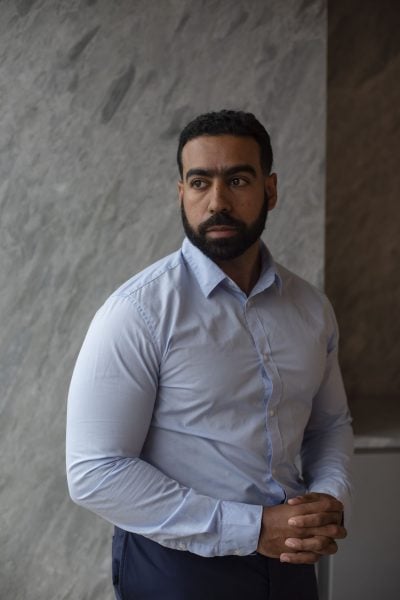
Carlos Polanco finished his bachelor’s degree at Bard College last year. He majored in applied mathematics in biology. PHOTO: JAMES SPRANKLE FOR THE WALL STREET JOURNAL
“It’s a passion of mine to be able to give what I know to others, specifically students, so they can navigate those sort of rough waters that college tends to sometimes drown you in,” he said.
Mr. Polanco moved to a New York City apartment and finished his bachelor’s degree at Bard last year. He majored in applied mathematics in biology.
After stints as an office manager and personal trainer, Mr. Polanco now works as an accounts-payable analyst at 40 North, an investment business on the 46th floor of a Midtown Manhattan office tower with panoramic views. He tapped the Bard network to find that post.
“To debate, it’s necessary to fully immerse yourself in the subject matter, and that skill set translates into any job,” Mr. Polanco said.
Read Full Article on the Wall Street Journal
